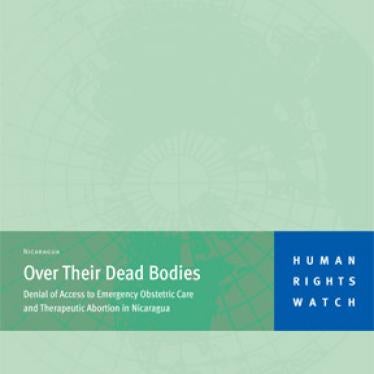Until recently, Nicaraguan women had something to celebrate on March 8, International Women’s Day. Nicaraguan women have fought for years to protect women’s rights, not to restrict them, and decades ago the government eliminated some of the sexist laws that discriminated against women.
But today, instead of building on these hard-won protections, Daniel Ortega’s government is chipping away at the very laws that put them in place. Nowhere is this setback starker than in women’s basic rights to life and health
International Women's Day this year marks a day of mourning as well as celebration in Nicaragua. In November 2006 the National Assembly enacted a blanket ban on abortion, criminalizing the procedure even when a woman’s life is at risk. Since then, dozens of Nicaraguan women with medical conditions that require a lifesaving therapeutic abortion or emergency obstetric care have died needless deaths or suffered severe disabilities.
Nicaraguan doctors told us of the chilling effect the ban has had on their ability to deliver emergency obstetric care. With healthcare workers fearing prosecution if they are suspected of an inducing an abortion, one young woman bled to death because she could not receive treatment in a public hospital. Doctors say they are torn between obeying the dictates of Nicaragua’s new penal code and ensuring their patient’s well-being.
In October 2007 we published a report documenting the devastating effects of the abortion ban and detailing how it violates women’s basic rights. We urged the Sandinista government to clarify the existing legal protocols for healthcare workers, but so far it has failed to do so, leaving women with no guarantee of timely and effective access to emergency services.
We also asked the Supreme Court to decide on the constitutionality of the ban, and called on President Ortega to veto the measure stripping the penal code of a provision that had allowed legal abortion for more than 130 years. So far neither the President, nor the Supreme Court, nor the state at large has responded by taking the necessary urgent actions.
Nicaraguans have also been requesting a decision from their Supreme Court. In January 2007 the Strategic Group for the Decriminalization of Abortion issued a petition to the Supreme Court to declare Law 603, which criminalizes all forms of therapeutic abortion, unconstitutional. The Supreme Court had 60 days to respond after the attorney general’s office, the national legislature, and the executive office issued their decisions. That window of opportunity closed on June 12 of last year. The Strategic Group submitted a written statement February 28 of this year, demanding that the Court respond to the petition filed in January 2007. But there are concerns that it may have to file yet another time if the new penal code goes into effect during this process.
The Supreme Court no doubt has many cases in its docket, but women’s lives and health remain at risk in the meantime. According to research by Dr. Arnold Toruño of the Universidad Autónoma de Nicaragua-León, historically although the law has prohibited induced abortions, there has in practice been a high rate of them in Nicaragua.
"Restrictive laws have had little effectiveness in stopping abortions from happening in our country," Dr. Toruño wrote. "The clear lesson is that offering prison to women, far from being a good solution to the problem, increases maternal mortality."
Indeed, consistent with the research, despite the ban, Nicaraguan women continue to need and have abortions, therapeutic and otherwise—but not in public hospitals and clinics. While wealthier Nicaraguans might obtain clandestine abortions at high premium, poor women and those in rural areas have no such recourse. Ironically, a leftist government’s policy is only reinforcing the vast social divide.
Maternal mortality rates in Nicaragua continue to be among the worst in the Western Hemisphere, but the Ministry of Health has begun to address the dearth of healthcare services for the poor. It has dispatched specially equipped brigades to remote areas and is importing Cuban doctors to fill gaps.
Last week the Ministry of Health reported a six percent decrease in the maternal mortality rate in the past year. These improvements may well reflect the government’s stepped-up efforts to expand access to health care. On the other hand, the prohibition of medically necessary procedures like therapeutic abortions is not only restricting women’s access to health care, but it is also putting their lives at risk.
On International Women’s Day this year, it is time to readjust the scenario and take back women’s health and lives.
Angela Heimburger and Lance Lattig are, respecitively, Americas researcher for the Women's Rights Division of Human Rights Watch and editor for Human Rights Watch.







